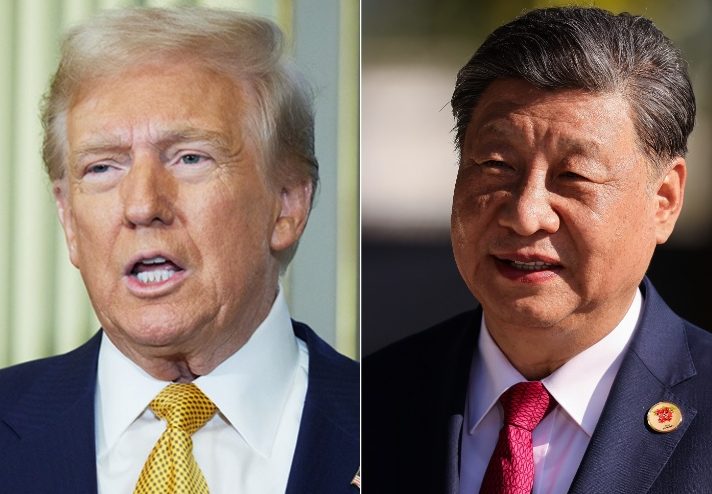Trump, Xi, and a Brewing Battle Over the Indian Ocean

MUSCAT, Oman—The winter is lovely in Oman. For centuries, this sultanate at the southern tip of the Arabian Peninsula has been a meeting point for the Middle East and the rest of Asia (its cuisine reflects this rich history). It signed its first treaty with the United States early in Andrew Jackson’s second term.
Jackson is back in the Oval Office—at least, his portrait is—and at the Indian Ocean Conference, I learned about the geopolitical stakes of the jockeying in this region, and what Donald Trump can do about it.
Dozens of ministers emphasized in their speeches how vital freedom of the seas is for their countries. Houthi attacks on ships traveling through the Red Sea deeply disturbed a region that depends on maritime trade. India usually tries to avoid Middle Eastern conflicts, but its military escorted merchant ships and rescued crews from vessels the Houthis struck.
The Biden administration’s stunning failure to protect these waters was mostly left unsaid at the conference. Freedom of the seas has been a core national interest since the Founding: Congress created the U.S. Navy to protect Americans sailing in the Middle East, and the U.S. Marine Corps anthem celebrates the Corps’ first overseas combat deployment, “to the shores of Tripoli.”
Joe Biden, however, flailed aimlessly for over a year while the Houthis boarded and sank ships traversing one of the world’s most important waterways. The Houthis have mostly ceased their unprovoked attacks, but they still retain their capabilities to wreak havoc on international shipping at will.
The Houthis and their imperial benefactors in Tehran are far from the only threat to American interests in the Indian Ocean. Communist China, which according to U.S. intelligence also arms the Houthis, is busy at work here as well.
Since taking control of China, Xi Jinping has launched a series of ventures to overthrow the U.S.-led international order and replace it with one centered in Beijing. His signature Belt and Road Initiative and its accompanying 21st Century Maritime Silk Road are part of this plan. He aims to extract resources from Africa, turn them into manufactured goods in China, and export them to developed economies such as Europe and the United States. The Indian Ocean is right in the middle.
China’s special envoy to the Middle East, Zhai Jun, made clear in his remarks that his country’s interests are not just related to economics. “The Indian Ocean is an indispensable part,” he said, of “the Global Development Initiative, Global Security Initiative, and Global Civilization Initiative,” which are part of Chairman Xi’s “vision of building a community with a shared future for mankind.” In other words, he wants the region to look to Beijing for the military, technological, and intellectual resources needed for the 21st century.
China is close to benefiting from an unforced British error. U.K. prime minister Keir Starmer is visiting Washington next week, in part, to request Trump’s approval to give away the Chagos Islands to nearby Mauritius. The Chagossians do not want to become part of Mauritius, where they were treated as second-class citizens. But for the British Left, this is not about justice for the displaced.
Britain’s attorney general Lord Hermer trumpeted that giving the islands and billions of pounds to Mauritius would “demonstrate our deep commitment to international law.” This is because the so-called International Court of Justice issued a nonbinding ruling in 2019 against Britain.
This turnover would be a disaster for the United States since Diego Garcia is one of these islands. The British cleared out the Chagossians about 50 years ago to construct an American base there that, among other things, can host heavy bombers. Starmer claims to have secured a 99-year lease, but there are reasons to doubt that it will hold.
For one thing, probity does not appear to be one of the Mauritian government’s strong points. The former prime minister who negotiated the transfer is under investigation for money laundering. The police arrested his successor for similar charges in 2015 and seized £3.2 million in cash. China already has a free trade agreement with Mauritius as well as a lot of investments there, and it is far better at exploiting that weakness than Western powers are. Beijing also flagrantly violates its own transfer agreement with Britain over Hong Kong.
Senate Foreign Relations chair Jim Risch (R., Idaho) said this week that the base is “indispensable” and that “ceding ground to China is dangerous surrender.” The more strategically minded governments in the region agree, but diplomatic sources at the conference tell me they are not eager to wade into colonial disputes.
In foreign policy, opportunities to do good and do well are few and far between. Vetoing this deal should be a no-brainer for Trump.


